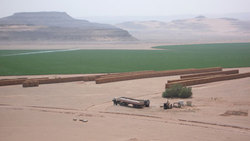Kingdom to double wheat reserves
Reuters | 15 June 2011
By JASON BENHAM
RIYADH: Saudi Arabia expects about two million tons of wheat imports this year unchanged from 2010, and aims to double its reserves to one year’s consumption by 2014, the Kingdom’s Minister of Agriculture said.
Saudi Arabia, which has emerged as a major buyer of wheat, wants to build up reserves of basic commodities such as wheat, rice, oils and sugar to protect itself against the impact of a spike in global food prices and to support its rapidly growing population.
The country began importing wheat in 2009 and is looking to rely entirely on wheat imports by 2016 as it seeks to save precious water.
“We set a policy that we should always have six months of supply in reserves at any moment. We decided this year to increase it to one year,” Fahd Balghunaim said.
The Kingdom currently has around 1.4 million tons of wheat reserves — the equivalent of six months — and will look to double that by 2014, Waleed El-Khereiji, Director General of the Grains Silos and Flour Mills Organization (GSFMO), later said.
The Kingdom is planning to phase out production of other water intensive crops including soya beans and animal fodder.
Saudi Arabia continues to invest in farmland abroad as part of its strategy to secure food supplies and is looking at Kazakhstan, Russia and Ukraine as “probable countries of investment” for growing, Balghunaim said.
Gulf states suffered when international food prices spiked to record levels in 2008, forcing up their import bills.
Last year Saudi Arabia set up a company with a capital of $800 million to invest in farmland abroad, focusing on wheat, rice, sugar and soybeans.
Saudi Industrial Development Fund is granting financing facilities to firms exploring agricultural investments abroad ranging from Indonesia to Ethiopia.
The Ministry of Agriculture acts as a “door opener” for private Saudi investors abroad, Balghunaim said.
Balghunaim said the kingdom, which already invests in Africa, would be interested in investing in south Sudan despite heightened tensions around the ill-defined north-south border.
South Sudan is due to become independent on July 9.
Companies such as Saudi-based National Agricultural Development Co (Nadec) and Abu Dhabi private firm Jenaan — have invested in farmland in northern Sudan.
“The intention is still there. For both north and south,” he said.













